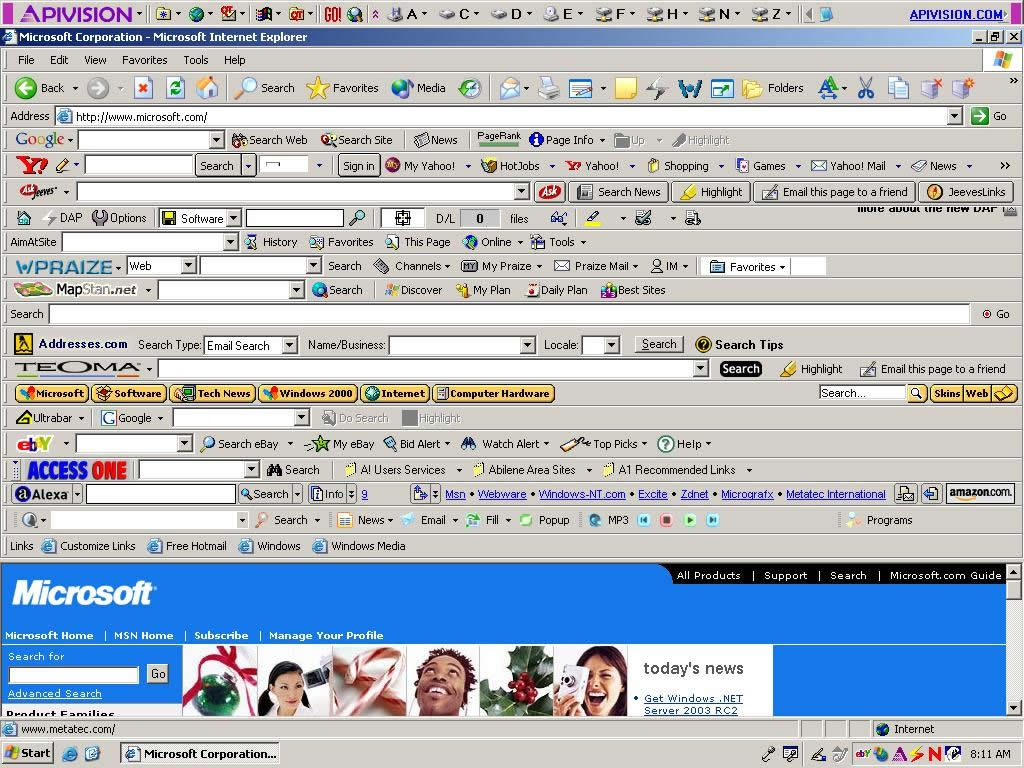stinerman
I am Stine. Comfort the afflicted. Afflict the comfortable. High School Wrestler™. Can usually correctly use the past tense in French. Suffers from clinical depression. @[email protected] on Mastodon.
- 0 Posts
- 26 Comments

 57·4 months ago
57·4 months agoYou can see exactly what he made in 2023. The report is available here.
€60k

 1·4 months ago
1·4 months agothe retailer is generally considered oblivious to the situation until proven otherwise they have zero incentive to vet the product.
In fact they are willfully ignorant because selling counterfeit merchandise helps line go up.

 5·7 months ago
5·7 months agoYes and it’s likely that they will not be allowed to any longer after Google lost their anti-trust case.

 172·7 months ago
172·7 months agoSomeone who repackages/patches free software has different incentives than upstream. So generally speaking, derivative browsers are more privacy friendly, have better features, etc.
That’s not to say that upstream isn’t important. It absolutely is! It’s just that derivatives are generally better.

 91·8 months ago
91·8 months agoThere’s a guy who works as a product owner at my employer. He has a PharmD. He got fed up with the metrics for how many prescriptions he had to fill. Now he does software.
It’s crazy to think that someone has a terminal degree in a really technical field and he nope’d out because of how bad it got.
I find that the F-Droid “system” is pretty opaque. There doesn’t seem to be any way that you can track a bug somewhere that a build is failing or who is working on it. Just the build fails and…hopefully someone realizes it and they’ll fix it at…some date in the future.

 10·11 months ago
10·11 months agoIt was specifically about the Christian God because all others were “obviously” incorrect. It’s terrible logic because it discounts:
- God somehow doesn’t know you’re believing in him “just in case” rather than because of actual faith.
- The wager implies that you should be an adherent of the religion that gets you the most stuff in the afterlife.

 13·1 year ago
13·1 year agoHe (Linus Torvalds) made Linux as a hobby during his time in college/university to teach him about operating system design. Because it was the part of the operating system called the kernel that the GNU project didn’t have yet (more on this in a moment), it became very popular. Richard Stallman created the GNU project because he believed that every person should have the right to study and share the software that runs on their computer.
There is nothing specifically anti-corporate in either of their motivations.
the only viable alternative, for 99% of the population, is Apple
This is largely because Windows and MacOS come preinstalled and that’s how the vast majority of people interact with operating systems. If you had to choose your OS, I’m sure there’d be more choice in the market. Not necessarily Linux, but just more choice in general.
I’ve been using some Linux flavor for about 15 years. The biggest thing about switching (at least back then) was I knew how to configure Windows just to my liking. With Linux it was a lot more difficult because I had to google everything. Like “how do I change the wallpaper?” How do I get the login screen to appear on the correct monitor, etc. It was just frustrating because I knew how to do this in Windows, but I felt like a major noob again with Linux.

 12·1 year ago
12·1 year agoThe “undermine the security, safety, and privacy of Oregonians by forcing device manufacturers to allow the use of parts of unknown origin in consumer devices” line is the same reasoning used by AT&T back in the old days as to why you couldn’t buy your own phone or use a dial-up modem.

 14·1 year ago
14·1 year agoI made about double that on betting that Donald Trump would lose the election after he had already lost the election. Now that was something I’m really proud of.

 8·1 year ago
8·1 year agoI’ve literally done the rm -rf / thing. I thought I was in a different subdirectory, but I was in / and did rm -rf .
When it didn’t return after half a second, I looked at the command again and hit CTRL+C about 20 times in the span of 3 seconds.
I had to rebuild the install, but luckily didn’t lose anything in /home.

 1·1 year ago
1·1 year agoAgreed, but I think there are enough flavors of Debian to satisfy someone if they want newer packages without resorting to Flatpak/Snap/etc.

 1·1 year ago
1·1 year agoInteresting. So far so good for me.

 161·1 year ago
161·1 year agoDNS blocking at the router never fails.


Of course you can fork it, but you can’t call it Mastodon. That’s trademarked. Just like how you can fork Firefox but have to call it Waterfox or Iceweasel or Librewolf.
The confusion here is between Mastodon the company and Mastodon the software and instances of the running software. Eugen Rochko owns the first two. He also owns the instances mastodon.social and mastodon.online. Everything else is outside of his control.